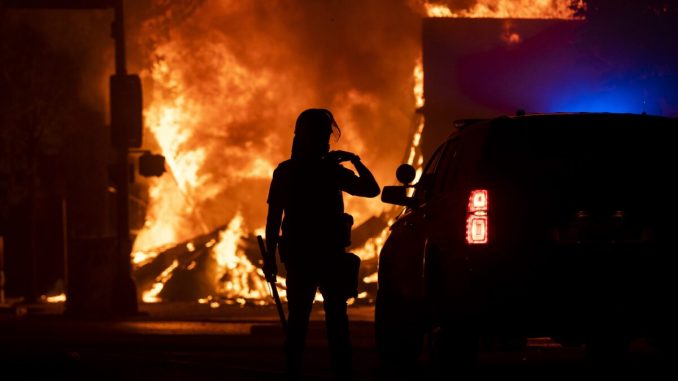

Commentary
ROME—Did a relatively unknown, Hungarian-born political philosopher discover the answer to countering dangerous, reactionary polarizations that have emerged in Western culture in recent years?
Understanding the foundation behind the current extreme movements in political activism to dismantle traditional forms of governance, cancel culture and critical theory may answer the causation behind the rhetoric, argued German philosophy professor Jan Benz, at a recent conference sponsored by Michael Severance of the Acton Institute in Rome, Italy.
Whether it is ANTIFA riots in Portland, the fiery protests in Washington, D.C. or the Black Lives Matter manifesto, Benz believes that Thomas Molnar’s understanding of man’s innate desire for authority answers the post-WWII socio-political movements that seek to dismantle traditional authority (from the family unit to governance), essentially in order to replace it with their own version of authoritarianism.
Benz argues that Molnar, who lived at one time under the Nazis, only to later witness the iron fist of the Soviet Communists in his native Hungary, understood the abuse of authority, but also that the notion of authority itself is not the root issue—but that the vacuum left through attacks on authority gives rise to abuse and extremism. Benz points especially to destructive movements on the left being founded by philosophers rooted in the Frankfurt School of Critical Theory, which later rooted itself in liberal scholastic institutions such as the University of Chicago—whose faculty have included Saul Alinsky and Barack Obama.
The Foundation: What is Authority?
Benz focused on Molnar’s book (he published over 40 books) “Authority and Its Enemies.”
“We, especially the current West, often associate authority not as positive—it has a more negative slant or connotation to it, it has a negative tone,” Benz said. “Consider even the arguments made by the left—if you are ‘for’ traditional forms of authority, then you ‘must be a Nazi.’ This extremist rhetoric is designed to implant a negative emotional reaction. Molnar states the reason behind this is that we have already been living the fruit of 50-plus years of dismantling rightful authority, and all associations with it.”
To understand rightful authority, Benz laid out a few guidelines from his studies of Molnar.
- Authority grants that in a group, every individual in the group is intrinsically free, in and of themselves, and chooses to be part of the group.
- Authority is a mediator between individual freedom and the group, whatever this social group is which the individual is a part of. Following this, authority structures inequality. If the structure of the group is not upheld through authority, that’s where inequality exists. So authority is in charge of managing and addressing inequality.
- Those in authority are charged, essentially, to lead the group towards a higher good that all have agreed on.
Benz continued to describe that whether or not one shirks from the idea of authority, it exists everywhere—family, school, sports clubs, church, nation.
“Authority exists when someone is in charge and if someone is not in charge, then whatever group there is will disintegrate—it will just dissolve.” He continued, “Molnar writes that authority is something that is rooted in human nature: authority, listening to authority and having authority in a group is something that is part of the human makeup.
“He writes that we follow authority not because it has a negative impact on us—we don’t seek bad things, naturally. We follow authority because there’s a certain consent of the heart, especially when the one in a position of authority is good!”
Benz quoted Molnar to drive home this point: “Ultimately we consent to authority, because respect for authority is as natural a response of our whole person as our love, contentment, pity, and pride of achievement.”
Benz said this was not a new concept, but perhaps a forgotten one. “Cicero posits that even if we have all of our needs satisfied, we will still group together. As I said, groups will disintegrate if there isn’t a natural authority or leader. To quote Cicero, ‘what prompts men to unite is less weakness than the innate need to be in their fellows company. Man is not made to live in isolation, to wander about in solitude. His nature impels him even when he has everything in abundance, to unite with other human beings.’”
The Reactionary: The Deconstructed Man
Why, then, the reactionary movements of the Left? Benz proposed that, because the reaction against figures who abused authority has taken root in academics for over half a century, those who promote traditional forms of authority do so fighting against a negative.
“People who want to attack authority, do so by placing an image of the ‘authoritarian leader’ in the fashion of say, Mussolini, in your head.” He continues, “Molnar states this straw man is one ‘who makes a fetish of a certain attitude—which we mean when we say he throws around his weight—a man who’s every manifestation oozes orders and commands. If we visualize him, we think of a firm jaw, strong man with severe eyes and stony features—unbending to human motivations, inscrutable, unapproachable, and ruthless.’ This picture is modeled after the anti-fascist (ANTIFA) caricature of Mussolini, and is not only false but it’s also childish because it is superficial and biased.”
If those in positions of authority continue to present not as “public servants,” Benz said, but that the “public must serve them,” more individuals will join with others to fight political, social or religious “authorities” that personify this caricature—for certainly no reasonable individual wishes to be associated with supporting this straw-man authoritarian.
“People don’t feel like leaders work for them, they feel like they have to work against these leaders, today—maybe more so than ever,” Benz said. Molnar suggests that this is called “Naked Authority,” the idea that authority will dictate and punish—a negative form in the minds of many.
Benz concludes that the reaction against this character is where a void is created. If the idea of a strong man is negative, then who is man to be? The reactions against this include even the dismantling of the Father figure in family, or the masculine identity in society.
Not surprisingly this reaction comes from, and was promoted by the anti-authoritarian Marxist Frankfurt School, said Benz—of Max Horkheimer, Theodor Adorno, Herbert Marcuse—who produce “Critical Theory” which, Molnar would write, “serves as the destruction of authority, replacing it with anarchy which leads to naked power over deeply potentiated and destructed individuals.”
This is key, said Benz, to understanding current socio-political movements, such as transgenderism, Critical Race Theory or even what has now been called by the World Economic Forum, “The Great Reset.”
“What’s so fascinating is that in the ‘development’ of this post-authoritarian reactionary ‘new man,’ the individual becomes so disintegrated and so detached from authority, that after you’re done with that process, he’s lost, and he doesn’t know what to do. His natural instinct, then, resorts to following the next person who takes advantage of this void, and who tells him, ‘follow me,’” said Benz. “This is why the ‘NPC’ meme became so popular—as it mocks the entire concept of individuality in these anti-authoritarian movements.”
Resetting Man Towards the Great Reset
Moving on, Benz addressed “The Great Reset” directly. “So right now—and using the crisis of a world epidemic—the people who want to be in charge need to succeed in telling their subjects that no one should be in charge, in order to create a situation in which they can assume power. Most people don’t think in this way, and often times not paying attention to how—especially—politicians are a step ahead of them in these machinations. A crisis in the magnitude we have faced allows for these actions and that rhetoric to occur, organically, as fear is an incredibly coercive power.”
Benz explained that this type of socio-political rhetoric is “utopian,” always pointing to a point in the future that will never be reached. Providing an example of this, he pointed to the rhetoric surrounding the recent pandemic, and the restrictions placed by world leaders.
“The crisis will be over when infection rates are below a certain point. It will be over when everyone is vaccinated. It will be over when everyone abides by certain regulations for a time. There will always be an excuse to extend power, and so it will never be over, until people have had enough of moving the goal posts.”
He continued that one need only observe the reactions from people to understand that these methods are working. “People consider themselves at fault for the continued power-struggle. ‘I have not been social distancing enough. Maybe I should wear two masks. Maybe I’m wrong about state-mandated vaccines and tracing.’”
With the Great Reset, and using this crisis as a launching point, Benz believes the western world is at a crossroads. “Those promoting this “new man” claim that if all who are struggling work together for this utopia—of course by the guidelines laid out by the World Economic Forum—then the future will see no war, no economic inequality and world peace. Led, again, by individuals mandating out of an assumed authority.
“What this ‘Great Reset’ proposes is a making of a new man—the liberated individual, the man that has come to his true self. It’s the making of a fourth industrial revolution: you have transhumanism; you have socializing private property; you have digitalization of human affairs including currency, and ideally you have universal basic income. Again, these are utopian, while everyday people face coercive rhetoric against their innate desire to be free.”
Man Cannot Solve Pain, But He Can Transcend It
How, then, can this mindset be reversed? “Molnar concludes that individuals must rationally understand the underlying notion that authority is an actual good, a positive and natural desire for a good,” said Benz.
“Any leader who wants to maintain rational and objective authority must bring the group—whatever group it is—towards achieving a higher good. This higher good is one that both individuals in the group and the one that is in authority agree upon—and that investment is what connects the two levels—the authority and the individual.
“We must also remember that the utopia being proposed as a counter to traditional authority consists of eradicating the effects of what Judeo-Christians call “original sin”: namely, hard work and pain. The problem is, these two effects cannot be eradicated by men. Not only this, they cannot be eradicated in an imminent way or even an applicable way, but only in a transcendental way.
“The ancients knew this, and thus the encouragement towards the virtues—not only bettering the individual towards a good, but a society working towards common growth. We can learn from these reactionary ideals by refocusing on the liberation of man through reenforced and natural authority—for man can only truly be free when he has come to understand himself in light of the good.”
Ms. Dail is the Rome Correspondent for The Epoch Times, a regular contributor for National Catholic Register and host of “Intersections with Bree and Joey” on Guadalupe Radio Network. She has contributed to Newsmax, Catholic News Agency, AP, The Daily Caller, The Catholic Herald, Catholic World Report, LifeSite News, OnePeterFive, along with appearances on new media outlets.
Views expressed in this article are the opinions of the author and do not necessarily reflect the views of The Epoch Times.





Be the first to comment